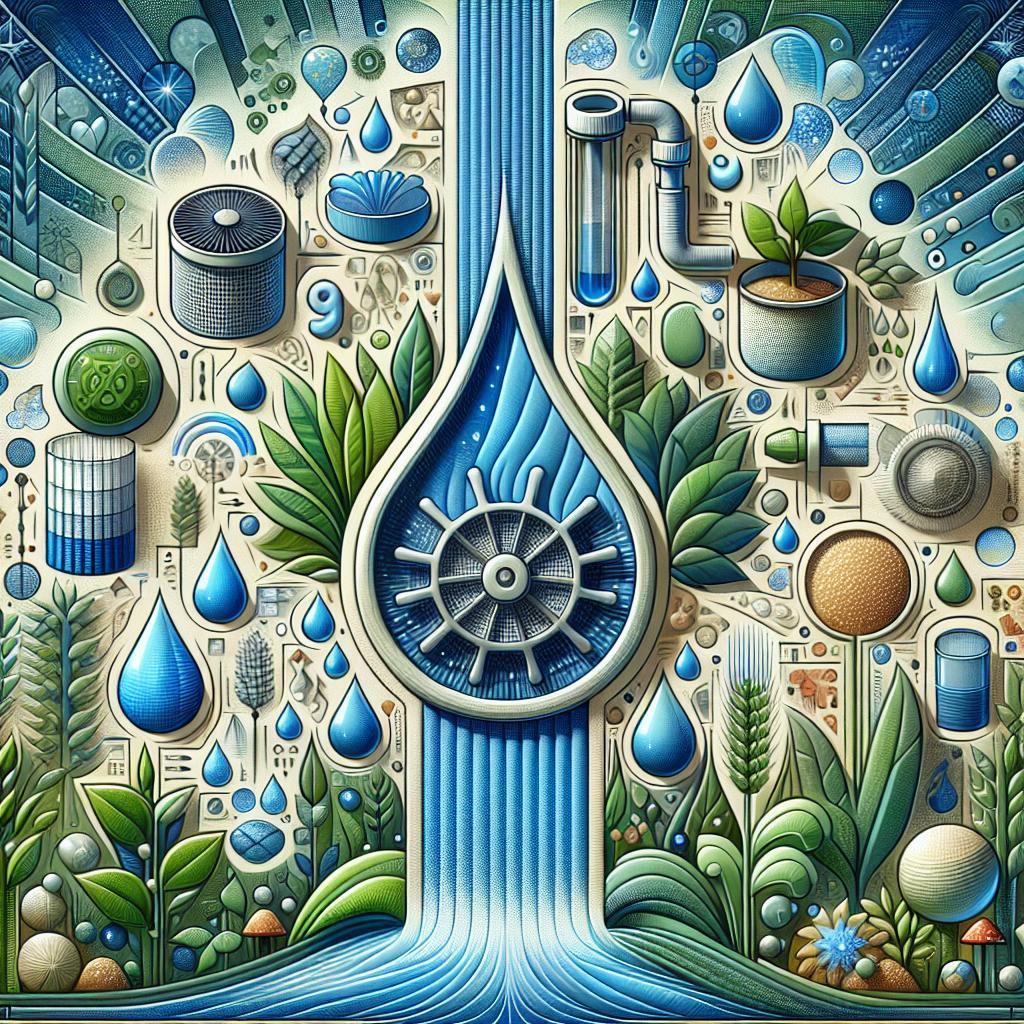This post may contain affiliate links which means I may receive a commission for purchases made through links. Learn more on my Private Policy page.
Welcome to the world of irrigation, where every drop of water counts! If you’re a gardening guru, a farming fanatic, or just someone who loves nurturing their green space, you know that efficient watering is the key to blooming success. But did you know that the type of filter you choose can make all the difference in your irrigation system? Just like our bodies need good nutrition, your plants thrive on clean, unobstructed water. In this article, we’re diving into the captivating realm of irrigation filters—those unsung heroes of the plant world. From mesh filters to sand filters, we’ll unravel the different types, explore their unique benefits, and help you determine which one is right for your garden or farm. So grab a cup of tea,kick back,and let’s get our hands dirty in the science of keeping your plants happy and healthy!
Exploring the Varieties of Irrigation Filters for Every Garden Need
When it comes to maintaining a flourishing garden, choosing the right irrigation filter can make all the difference. There are several varieties, each tailored to different watering needs and garden setups. As a notable example, screen filters, known for their ability to efficiently remove large particles, are perfect for setups with less sediment in the water. on the other hand, disc filters provide deeper filtration and are ideal for gardening systems that tend to have more organic debris, making them a preferred choice for vegetable gardens.
Another popular option is sand media filters, which excel in removing smaller particles and are often used in larger landscapes or commercial applications. Their ability to handle high flow rates means they can support extensive irrigation systems without compromising water quality. For those using inline filters, their convenient integration into existing tube systems provides easy maintenance and consistent performance. Regardless of the choice, each filter type serves a unique purpose, ensuring that your garden receives clean and healthy water for optimal growth.

The Key Benefits of Using Filters in Your Irrigation System
Utilizing filters in your irrigation system brings a myriad of advantages that can substantially enhance the efficiency and longevity of your setup. First and foremost, filters effectively remove debris, sediment, and contaminants from the water before it reaches your plants. This prevents clogging in the irrigation lines and ensures a consistent flow, which is critical for healthy plant growth. By keeping your system clean, you’ll also reduce maintenance costs and extend the lifespan of your irrigation equipment.
Additionally,filters help preserve water quality,which is vital for the overall health of your garden or farm. Clean water promotes better nutrient absorption and enhances plant vitality. Consider these key benefits of incorporating filters into your irrigation system:
- Improved water Quality: Ensures that only clean water reaches your plants, resulting in optimal growth.
- Lower Maintenance: Reduces the frequency of system cleanings and repairs.
- Increased Efficiency: Maximizes the output and effectiveness of your irrigation system.
Choosing the Right filter: A Guide to Compatibility and Efficiency
When selecting an irrigation filter, compatibility with your existing system is paramount. Different filters cater to varying needs based on water quality and system types. Start by determining your water source—whether it’s groundwater, surface water, or reclaimed water—since this influences filter choice significantly. consider these essential factors:
- filtration Type: Decide between screen, disc, or sand filters based on particle size and sediment levels.
- Flow Rate: Ensure the filter can handle the required flow rate without causing pressure drops.
- Size and Installation: Choose a filter size that fits your system and is straightforward to install.
Efficiency is equally critically important when making your selection. A well-chosen filter not only protects your irrigation system but also improves water use efficiency, ultimately leading to healthier crops. To maximize the effectiveness of your filter, monitor its performance regularly and clean or replace it as needed.Consider these key efficiency indicators:
| Efficiency Indicator | Importance |
|---|---|
| Pressure Loss | Low pressure loss ensures optimal flow and savings on energy costs. |
| Maintenance Frequency | Lower maintenance indicates higher efficiency and longer equipment lifespan. |

Maintaining Your Irrigation Filters for Longevity and Optimal Performance
Taking the time to care for your irrigation filters is essential in ensuring they work effectively and have a long lifespan. Regular maintenance not only keeps your system running smoothly, but it also helps prevent clogs and malfunctions that could disrupt water flow to your plants. To maintain your filters, consider implementing the following practices:
- Frequent Cleaning: Depending on the level of debris in your water source, clean your filters every few weeks or monthly to remove accumulated particles.
- Inspect for Damage: Regularly check filters for cracks or wear that may compromise their effectiveness. Replace damaged filters promptly.
- Seasonal Maintenance: Perform a thorough system inspection at the start and end of each irrigation season to ensure all components are functioning properly.
Choosing the right type of filter for your irrigation system is equally important as maintaining it.Different filters suit various water qualities and flow rates. Here’s a rapid overview of common filter types and their advantages:
| Filter Type | Benefits |
|---|---|
| Screen Filters | Effective for removing larger particles; easy to clean and maintain. |
| Disc Filters | Good for fine filtration; offers a large surface area and longer cleaning intervals. |
| Suction Filters | Prevents debris from entering the pump; ideal for untreated water sources. |
Key Takeaways
As we wrap up our exploration of the various types of irrigation filters and their unique benefits, remember that choosing the right one is not just about enhancing your garden but nurturing your relationship with nature. Whether you opt for a simple screen filter or a more advanced media filter, the right irrigation system can make a world of difference in water efficiency, plant health, and soil sustainability.
So, as you stand in your garden or perhaps at a community farm, take a moment to appreciate the gentle rythm of nature’s dance—every drop of water counts. With the knowledge you’ve gained, you’re now equipped to make informed decisions that not only serve your plants but also support the environment we all cherish.
Here’s to thriving gardens, bountiful harvests, and, most importantly, a deeper connection to the Earth. Happy watering! 🌱💧
This post may contain affiliate links which means I may receive a commission for purchases made through links. Learn more on my Private Policy page.

